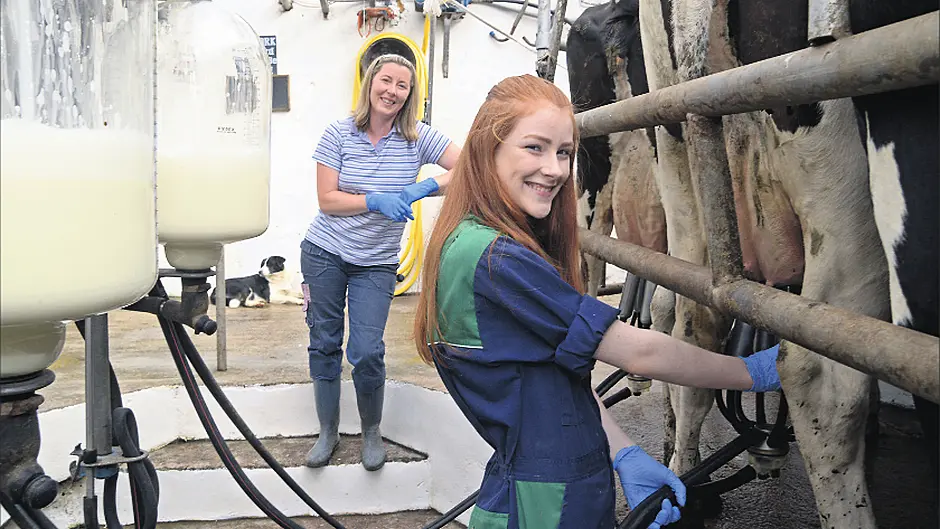MODERN machinery and technology have created an opportunity for all genders to farm – the last obstacle is to purge the mindset that it’s a male-oriented career.
That’s according to award-winning Upton farmer Vanessa Kiely O’Connor who is the West Cork and ICMSA voice on a newly formed group designed to get more women involved in farming.
Called Women in Agriculture Stakeholders Group (WASG), they specifically want to increase the current 12% of female famers in this country to 25% in the lifetime of the next Cap, and also want to get more recognition for the work already being done by existing female farmers.
WASG comprises representatives from the Irish Farmers Association (IFA), Irish Creamery Milk Suppliers Association (ICMSA), Irish Cattle and Sheep Association (ICSA), Irish Natura and Hill Farmers Association (INHFA), Macra na Feirme, Irish Organic Association (IOA), South East Women in Farming and West Women in Farming.
Figures obtained by the group show that less than 4% of Tams payments from the Department of Agriculture to build sheds and buy farm machinery went to female farmers.
Out of 20,612 payments since 2016, just 751 were made to women. In addition, just 97 of those payments were made to women under 35 years of age.
Figures secured by the group also show a low level of female participants in the Knowledge Transfer (KT) scheme.
For example, just three and seven women took part in KT groups in Longford and Cavan respectively. A sector breakdown further shows that just 565 women – out of 3,567 overall participants – signed up to dairy KT groups and 15 counties did not have any groups with women in dairy groups.
Chair of the group, Hannah Quinn-Mulligan said agriculture is one of Ireland’s most valuable industries and family farms are the lifeblood of rural Ireland.
‘But, unfortunately, research shows there is an inclusivity issue where the work of women on farms is not officially recognised, and young women are less likely to be considered or encouraged to be farm successors.
‘The aim of our group is to ensure that women across rural Ireland receive the official recognition for the work they do on farms and that young women feel they have prospects inside the farm gate they call home.’
They pointed to the fact that the Department of Agriculture’s own analysis had outlined a ‘cultural bias’ towards men and that just 3.8% of farms were registered in joint male and female names, despite CSO figures showing that up to 25% of the work done on farms was undertaken in part or fully by women.
The group has now made a submission to the Department of Agriculture on the Common Agricultural Policy (Cap) 2023 – 2027 with a core focus on the creation of practical, inclusive policies to tackle gender balance in Irish agriculture.
These include the Department of Agriculture setting a target of 25% female famers by 2030, up from the current 12%.
They also want a 60% Tams grant for all female farmers and joint partnerships with a named female partner. Female only KT groups and groups with at least three female members to receive a top-up per participant is another proposal.
They are calling for a partnership tax credit where a named female partner is added to the farm, the farm would receive a €5,000 a year tax credit over a five-year period.
‘The partnership must have at least two members and the incoming female partner does not have to be a blood relative to allow for daughters-in-law, wives or partners to join,’ they said.
Macra na Feirme representative Louise Crowley said almost every farm in Ireland has a woman involved in some way shape or form. ‘These women must first be recognised and this recognition will be one of the steps to encouraging more women, and especially young women, into a career in farming,’ she added.
Mona O’Donoghue Concannon of the ICSA pointed out that female leadership roles needed to be encouraged.
‘ICSA are always thriving for inclusion of women in farm policy decision making and encouraging leadership skills development in farm organisation by encouraging and mentoring the skilled people already involved in the industry on a daily basis.
‘Through Cap and the new group greater heights will be reached,’ she said.
Gillian Westbrook, chief executive of the Irish Organic Association (IOA) added: ‘Creating a strong agricultural sector necessitates that inclusion, diversity and strong leadership is displayed at all levels and I look forward to working in this context under the next Cap.’
Caroline Farrell of the IFA said the organisation was ‘100% behind behind the stakeholder group and endeavour to improve the profile of women in farming.’
The group believe it’s now time to officially recognise the work women do on farms.









